Turn and Smile Prime Time, May 15th: Your Friends And Neighbours, Castle Impossible, Dark Money Game
Yeah, let's talk about money.
Welcome back, Sofa Taters!
This week, we have money on our mind, Sofa Taters! So please feel free to share some with us 😆.
After watching Race For The Crown last week and spending time with those investment and sports drink millionaires, we started thinking about the one percent, which led us to choose the shows featured this week. We will be exploring the fall of the elite with the explosive opening sequence of Your Friends and Neighbours, how nepo babies choose to spend their inheritance (restoring castles apparently) in Castle: Impossible, and finally, a full season bathing in the corruption of the US government in The Dark Money Game.
It’s a real shame that money is the root of all evil, and so many of the rich and powerful spend their riches on corruption, crime, and self-indulgent vanity projects and don’t spend it on erecting a giant monument For The Honour Of Greyskull.
Speaking of The Honour Of Greyskull, we are pushing towards 100 subscribers after which Larissa will finally watch Netflix’s She-Ra and the Princesses of Power, so if you’re not subscribed already, please subscribe now so we can review this colourful show!
Table Of Contents
OPENING SEQUENCE REVIEW: Your Friends And Neighbours
Summary: Series creator Jonathan Tropper collaborated with John Likens (Framestore Pictures) to create an opening sequence that visualizes the collapse of an ultra-rich man’s life unravelling. As he apathetically walks through his curated life void of people, the material possessions he surrounds himself with explode, including his crystal wine glasses, Philippe Patek watch, and Maserati car. The song "The Joneses" by Hamilton Leithauser & Dominic Lewis plays in the background. It was filmed over a 2-day live-action shoot with John Hamm and created with custom VFX animation techniques from Tomas Slancik.
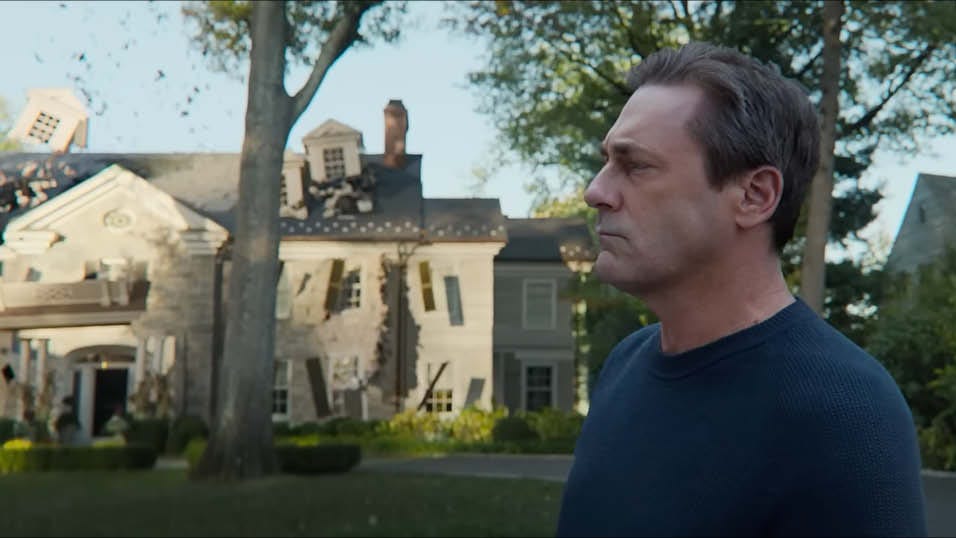
Sound 🌟🌟🌟🌟🌟
Mason’s take: The song itself seems to have been written specifically for the show by composer and British icon Dominic Lewis and American icon Hamilton Leithauser. Leithauser is a musician by trade, having previously been a band member of The Recoys and currently playing with the indie, post-punk revival band The Walkmen. The song is an interesting choice considering that the norm for similar shows is usually either a hard or soft melodic tone to correspond with the protagonist’s moral corruption and descent into crime. Instead, the lyrics of the song, “The Joneses,” frame the show with an explicitly anti-capitalist lens, not lamenting the speaker’s poverty but proudly announcing it as they proclaim that they’re not even attempting to keep up with the Joneses.
Larissa’s take: I have had this song stuck in my head multiple times as we have been going through this show. I only found out that this song was made for the show when we were researching this newsletter. It feels like it should be on the Billboard alt-rock charts.
Conveyance (of Tone/Theme) 🌟🌟🌟🌟
Mason’s take: The psychological thriller aesthetic combined with the punk anthem style music gives me a cognitive dissonance that I’m not used to. I find myself wanting to look away and just enjoy the music. But at the same time, the show’s themes seem to align with that. Coop is a man who is technically a class traitor. He’s caught between worlds. Much like the elements of this opening sequence.
Larissa’s Take: I loved the opening and thought this dissonance set up the audience up for the viewing experience of the show. At times, it’s a bit Rear View Mirror meets American Beauty but then slides into self-relective comedic relief. If anything, I felt like it could be a bit repetitive with different types of expensive items bursting into fractured pieces over and over. It hammers home the fall from grace of John Hamm’s character a bit too much. Coop as a character is resourceful, and even though is hit with several financial blows in quick succession, gains traction in thievery relatively quickly. I would have liked to see at least a hint of him picking up the pieces of his broken life, even by duplicitous means, in this opening sequence a bit more.
Aesthetic 🌟🌟🌟🌟🌟
Mason’s take: I’m not 100% convinced that the sequence isn’t at least partially AI-generated, and honestly when I first saw it the somewhat inhuman way the visual elements broke apart it made me question its authenticity, but at the very least it does leave me on edge in the same way that the Severance opening did.
Larissa’s take: FX Supervisor Tomas Slancik apparently engineered custom computer graphics tools to warp Coop’s reality in this opening sequence, layering textures of rot over pristine surfaces. Slancik also created custom animation techniques for the cinematic appearance of Coop’s materialism’s unraveling. Now, are these “custom” animations and computer graphics tools created and utilized with the help of AI? Probably. But if they did, it was done the way AI should be used, to better elevate art.
Innovation 🌟🌟🌟
Larissa’s take: I just talked about all the custom VFX techniques that went into the production of this opening sequence, but even still, it feels like we have seen it before. Maybe in a U2 music video.
Mason’s take: It feels like even if this show was made ten years ago, it wouldn’t have had a theme song like this. Generally speaking, the millionaires who fund television shows try not to get all them poor people too riled up, so I do consider that, in and of itself, at least some innovation. Now, if you’ll excuse me, I’m going to try to do some shopping for a little public gathering in Austin, Texas, at the Tesla factory.
Overall Opening Rating 🌟🌟🌟🌟🌟
EPISODE REVIEW: Castle Impossible, S1, E1, “Sleeping Beauties: The Tower Bedroom”
Summary of Episode: As if from a fairytale story, Daphne Reckert inherits a castle in France from her late grandfather, and with her husband Ian Figueira, uproots their life to commit to renovating the 500-year-old estate. Episode by episode, we follow the couple as they take on reno projects, as with a centuries-old castle comes centuries of wear and tear. In this first episode, Daphne and Ian took on the Solar, a private enclave in the castle that will be converted into their bedroom.
Plot/Drama: 🌟
Mason’s take: The drama in the first episode was very overblown. Very low stakes. Not very hype, as Larissa would probably say. They tried to make a windstorm out to be a threat to the bell tower over the Solar and (probably for obvious reasons) didn’t choose to mention that its not uncommon for the area to get similar windstorms and the bell tower has remained standing for about 400 years without incident the whole time. While it could have been possible for the tower to fall due to the rot in the Solar, it was no less rotten the year before, or the year before that. Chances are likely that if it was at risk of being blown over, there would have been more catastrophic damage and rotting before it got to that point.
Larissa’s take: The drama was indeed not very hype. It reminded me of the fabricated drama in Love It or List It, with an otherwise seamless reno that everyone is happy with. Did Daphne and Ian need to invest thousands in a structure that probably would have stood up for at least half a century longer? Probably not. Did they even have to spend $40,000 in the first place to do a weird bedroom on the top floor of an otherwise uninhabitable castle with no bathroom or kitchen around it? Also probably not. But you know, it’s a nepo baby life, and we are just here living vicariously.
Personalities 🌟🌟🌟
Larissa’s take: The main personalities were Daphne, the benefactor in all of this, her husband Ian, and the Master-of-All-Trades handyman hired by Daphne and Ian, Tony. Overall, the couple comes across as fairly relatable, despite owning a massive French country castle estate. We see the pair take on the brunt of the labour with Tony, including the unnecessary bell tower stabilization. However the cracks in the every-man facade begin to show when Daphne casually mentions the millions in inheritance tax they had to pay with the same annoyance of someone having to unexpectedly pay for a new car battery, Ian shaking his fist at kids on his (130 acre) lawn, and both laughing at the absurdity that they technically own more land than the entire town.
Mason’s take: I don’t like the husband. He started out seeming like a quirky millennial, an affable guy who maybe lucked out early in life with a nepotistic career and finding his soul mate in high school, but as the episode carried on, he felt more and more like a one-percenter. Weirdly ornery about locals in the French village entering the unmaintained property when they were used to it being unsecured and unlived in for multiple generations before them (it’s notable that his wife is American and made no mention of having duel French-American citizenship, and that had to happen somehow), making his big feelings about trespassing on what the village surely must consider a historic landmark unjustified.
The wife, however, seems like she has unrealistic expectations of the cost of owning the property. Traditionally, properties like this were held and maintained by massively wealthy aristocrats who could afford to staff and maintain it (and a whole staff is required for such a property), or by cities that use it to generate profit and use some of that profit to maintain it. Daphne and Ian could be independently wealthy (and putting on an act to appear more relatable to viewers), or they could not be aware of the actual cost associated with maintaining a property of that size, which is also a full-time job.
But I like Tony, the handman. He seems like a good chap and a very skilled craftsman. The show needs more of Tony.
A great way to offset the cost of the renovation is to donate the property to the village, let them turn it into a tourist attraction and public land, use money from the sale of some of the land and buildings on the property to live on or something, enter into a profit sharing agreement with the village, and then live rent free for the rest of their lives. And then the husband can stop having a conniption whenever a bicyclist or jogger passes through.
Aesthetic 🌟🌟🌟🌟
Mason’s take: Somebody give the production designer of this series an Emmy because they are doing a lot with very little. Naturally, it’s very hard to have a Downton Abbey style setting and not have it look like an awe-inspiring piece of magnificence and to their credit, even though the property is in total disrepair, they still do that.
Larissa’s take: I want to live here, you want to live here, we all want to live here. The castle is gorgeous, the estate views are breathtaking, and the renovations Daphne and Ian are doing are refined, elegant, and understated. Even still, it is a renovation show after all, and we see in this initial episode that the whole place is falling apart. So, we had to take off one star due to hundreds of years of gross negligence. And spite.
Innovation 🌟🌟🌟
Mason’s take: The only thing new about this show is that it’s centred around a huge, expensive, old property. In many ways, it’s exactly like any other home renovation show, but in my opinion, it lacks a good reason to return to it (namely, ⅖ of the NKOTB, Vanilla Ice, conflicting personalities, or a competition).
Larissa’s take: The draw of this is the castle, for sure. A lot of shows center around upgrading out-of-date dysfunctional residential homes with tight budgets. It’s a unique premise to have a show centred around an estate that epitomizes “good bones” with a couple with deep enough pockets to do the reno justice. I would have liked them to talk more about the business and use case for their estate. They mentioned a wedding business - how will they be making their property all season to maintain bookings? How will they renovate the second-floor rooms to accommodate guests? But I don’t think that’s really on their minds. A bit like Pamela’s Garden of Eden, this show definitely feels like we are flies on the wall watching a passion project play out.
Overall Rating 🌟🌟
SEASON REVIEW: The Dark Money Game
Summary of Series: This docuseries tells two stories in two episodes. One of corruption in Ohio that resulted in arrests and a suicide. The other is a look at politics and campaign fundraising 15 years after the Citizens United ruling allowed unlimited anonymous political spending. It is based on the book “Dark Money” by Jane Mayer, who is also featured prominently in the docuseries.
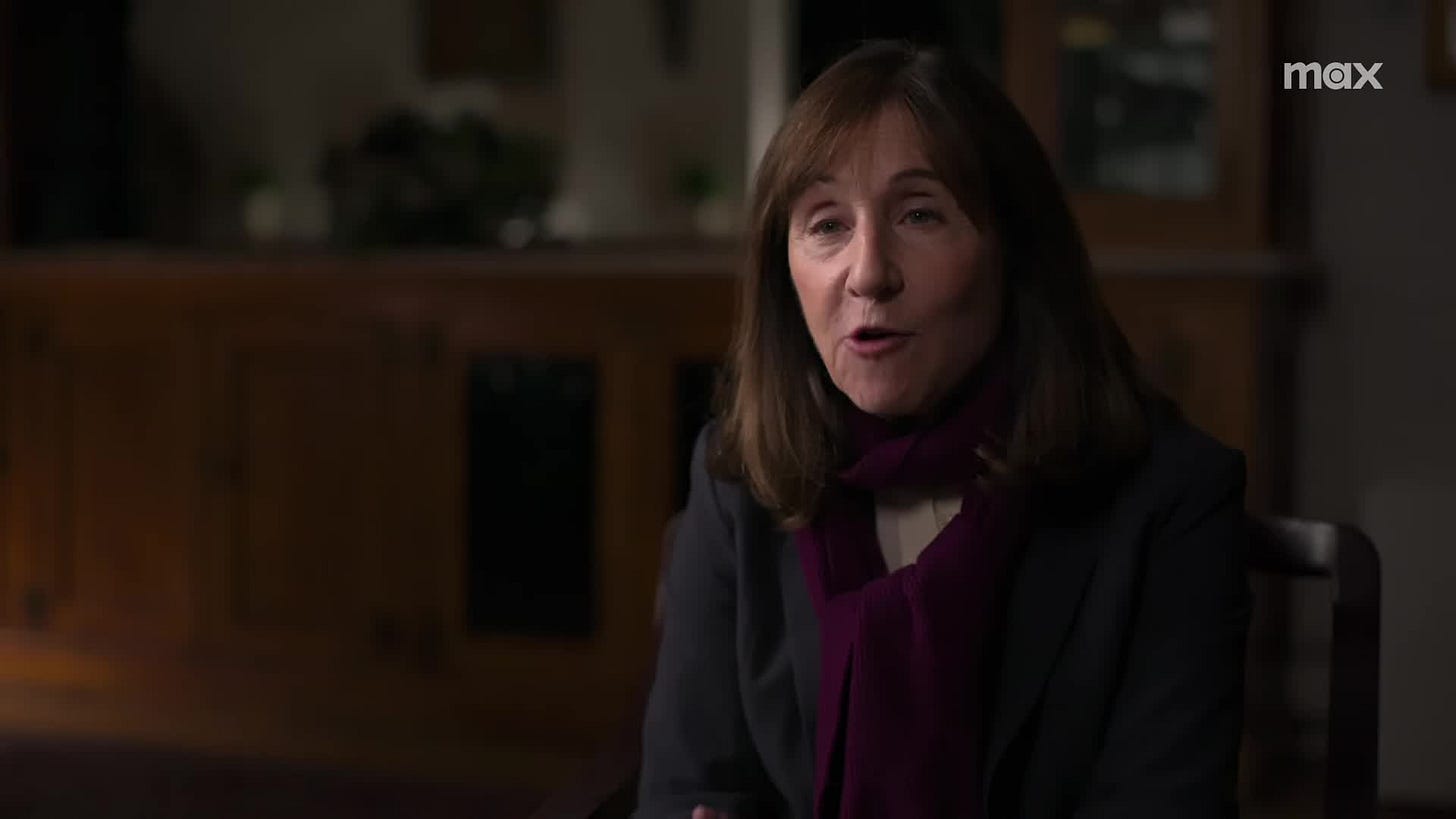
Plot/Drama 🌟🌟🌟🌟🌟
Larissa’s take: Jane Mayer first published Dark Money in 2016. By the time we are watching this docuseries in 2025, it feels about a decade too late to take any action. It’s an excellent summary of how we all got here - from gerrymandering to clawing back legislation protecting citizens from greed of corporations, to the infiltration of Christian religious zealots in politics, to the dismantling women’s rights nationally - but it’s all been said before. Read any Substack, regardless of whether they specialize in politics, and they will be complaining about the same issues. It doesn’t feel like the veil is being lifted on any scandal, but more like an overview of the exact American political climate we deal with globally. However, this docuseries organizes many topics into an easy-to-follow money trail to political corruption with nuances that even a politics news enthusiast will find insightful, so worth a watch even just as reinforcement.
Mason’s take: “Earnest” fiscal conservatives often like to complain about the “inflated” salaries of politicians. In Canada, for example, the Prime Minister earns a salary of roughly $200,000/ year, and Members of Parliament earn about half of that. Multiple countries, however, (Canada included) have regulations and laws that ban people from running in an election or serving in any elected roles (or in a political appointment) if they have debts, and also ban politicians from having a second job, serving on boards, and other activities in the market even if they are unpaid. This is done to avoid corruption in government. Politicians have to be well paid and without substantial debt to avoid most bribery and corrupt influence. Citizens United v. FEC, the court case that allowed unfettered political donations, legalized bribery in American politics.
Personalities 🌟🌟🌟🌟🌟
Mason’s take: The standout personality for me was Rev. Robert Schenck, who is introduced to viewers as an Evangelical Christian minister and anti-abortion activist. Don’t worry, the anti-abortion movement is very entrenched in the motives behind the Citizens United case and the groups that most frequently use it to their advantage. It gets wild. Rev. Schenck makes his appearance in episode two, the second documentary in the series, and tells his story before revealing that he had a revelation while held in jail for harassing women outside an abortion clinic when he saw firsthand how important the bodily autonomy of women is and then switched sides. I’m sure that I would still disagree on many other topics with Rev. Schenck, considering my experience with Evangelical Christianity has shed light on the quiet cultural genocide they’re advocating for against all other faiths, forms of spirituality, and cultures, but on this one matter, we agree. The reveal about his beliefs was a very compelling turn.
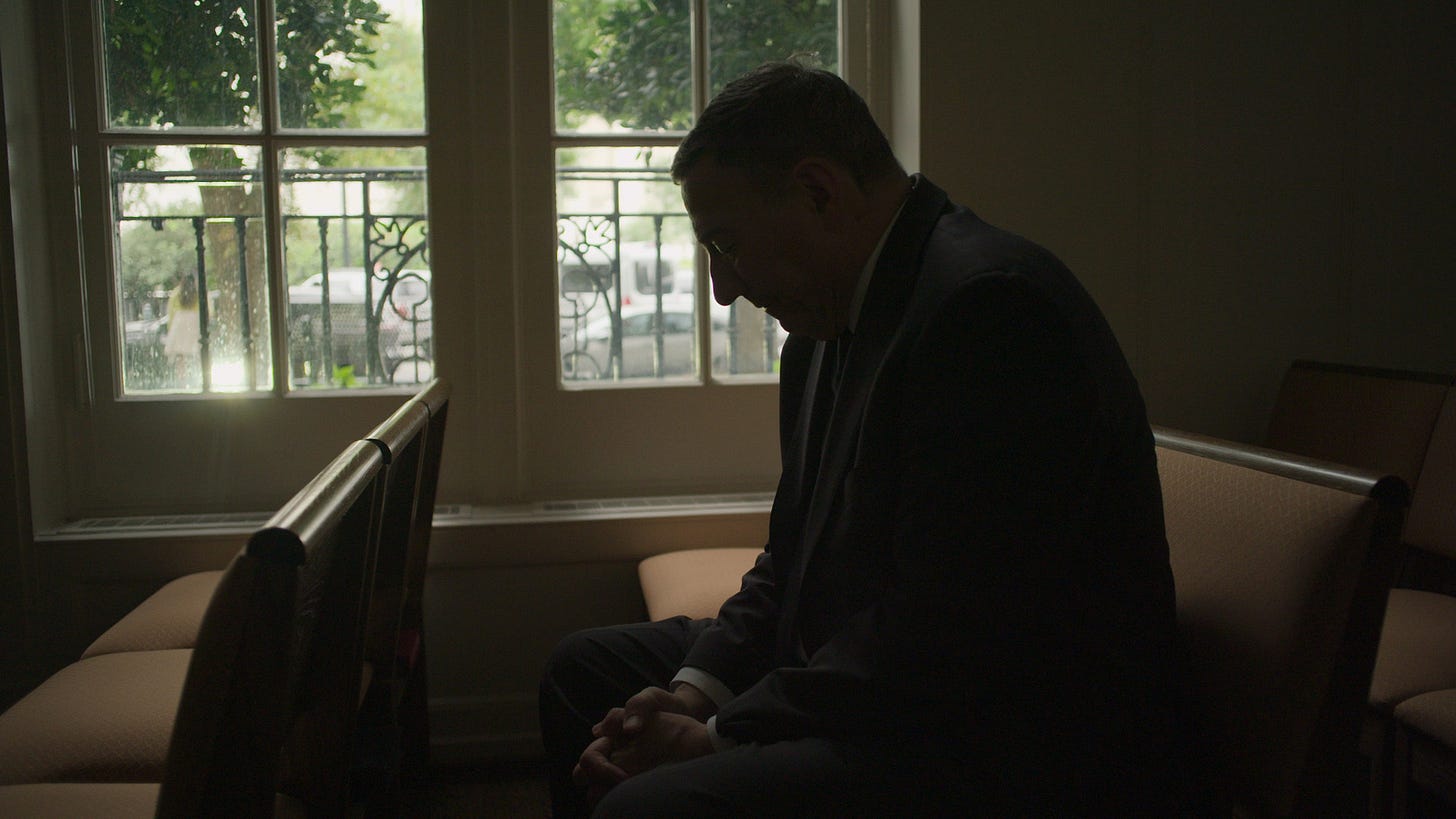
Larissa’s take: Wow. Robert Schenck. He literally had a “come to Jesus” moment. There is a certain schadenfreude in watching his regret on screen. Big props to Jane Mayer, an investigative journalist at the New Yorker, who seemingly has worked tirelessly to get political corruption out into the public zeitgeist for decades. If we have heard the message of this specific documentary before, it’s because of everything Jane and journalists like her do every day.
Aesthetic 🌟🌟🌟🌟🌟
Mason’s take: Some might disagree with me, but I think this was an effective use of the neo-noir aesthetic. Maybe slightly hackneyed by the end of the second episode, this was still, as it always is, a very attention-grabbing style choice.
Larissa’s take: I agree with Mason here. We might have seen this exact style before in every muder-mystery true crime documentary but in this case, the OTT framing was justified.
Innovation 🌟
Larissa’s take: Holy toledo batman! Did you know that big corporations are spending billions of dollars to rig elections, and then continue to bribe officials to do their bidding, all in the name of capitalist greed, and that these politicians will agree so they can get legislation passed that enforces their narrow-minded world view based on fringe Christian dogma? Again, I am unsure why producers waited so long to green-light this documentary after the Dark Money book was published. A decade ago, this might have been a wake-up call. Today, we all (or most of us) are acutely aware of the nightmare in which we live.
Mason’s take: It doesn’t really seem at all innovative in terms of style or even content. If I needed to explain the prototypical documentary style to someone who has never seen a documentary, I would probably point to this one.









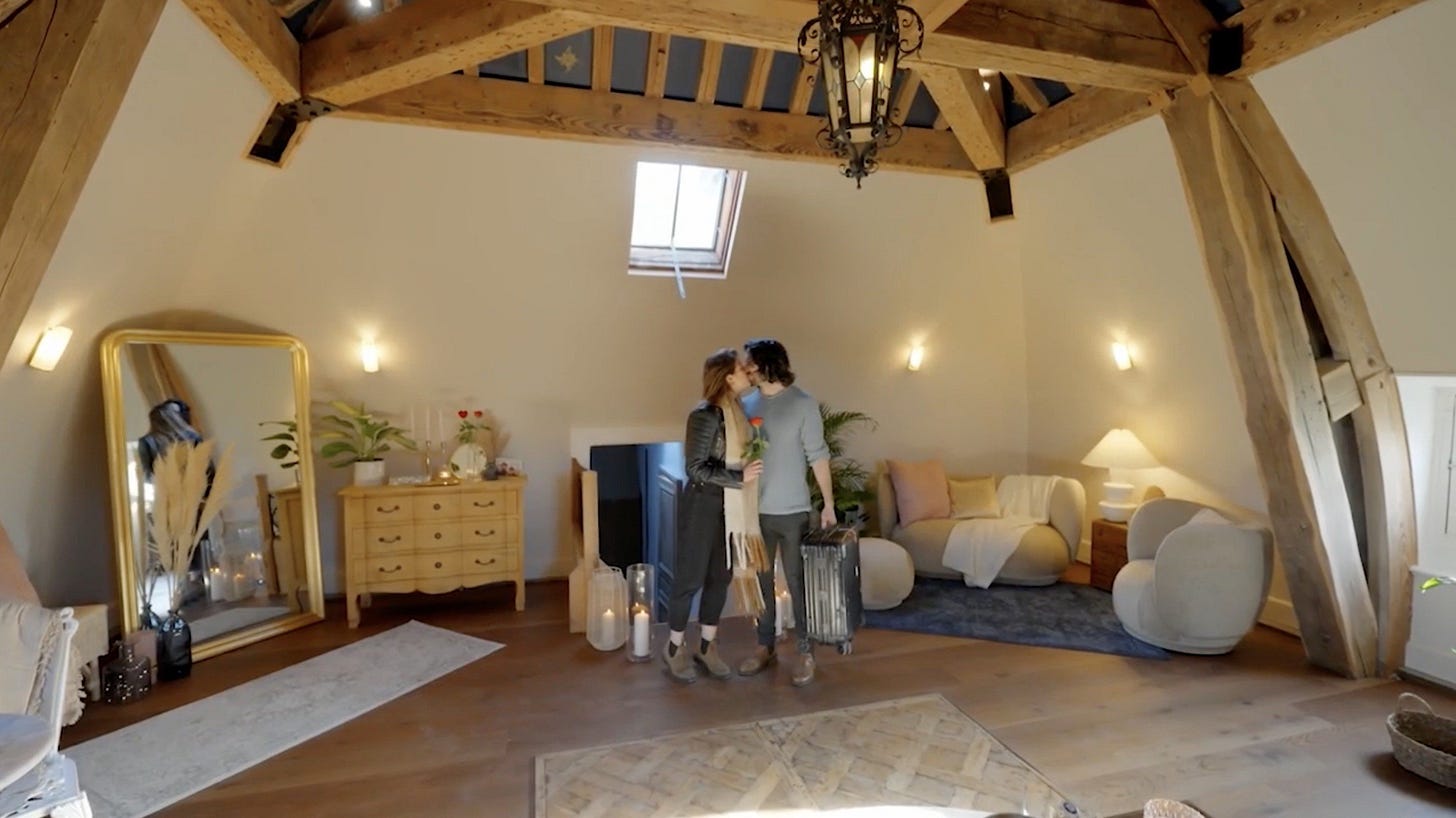
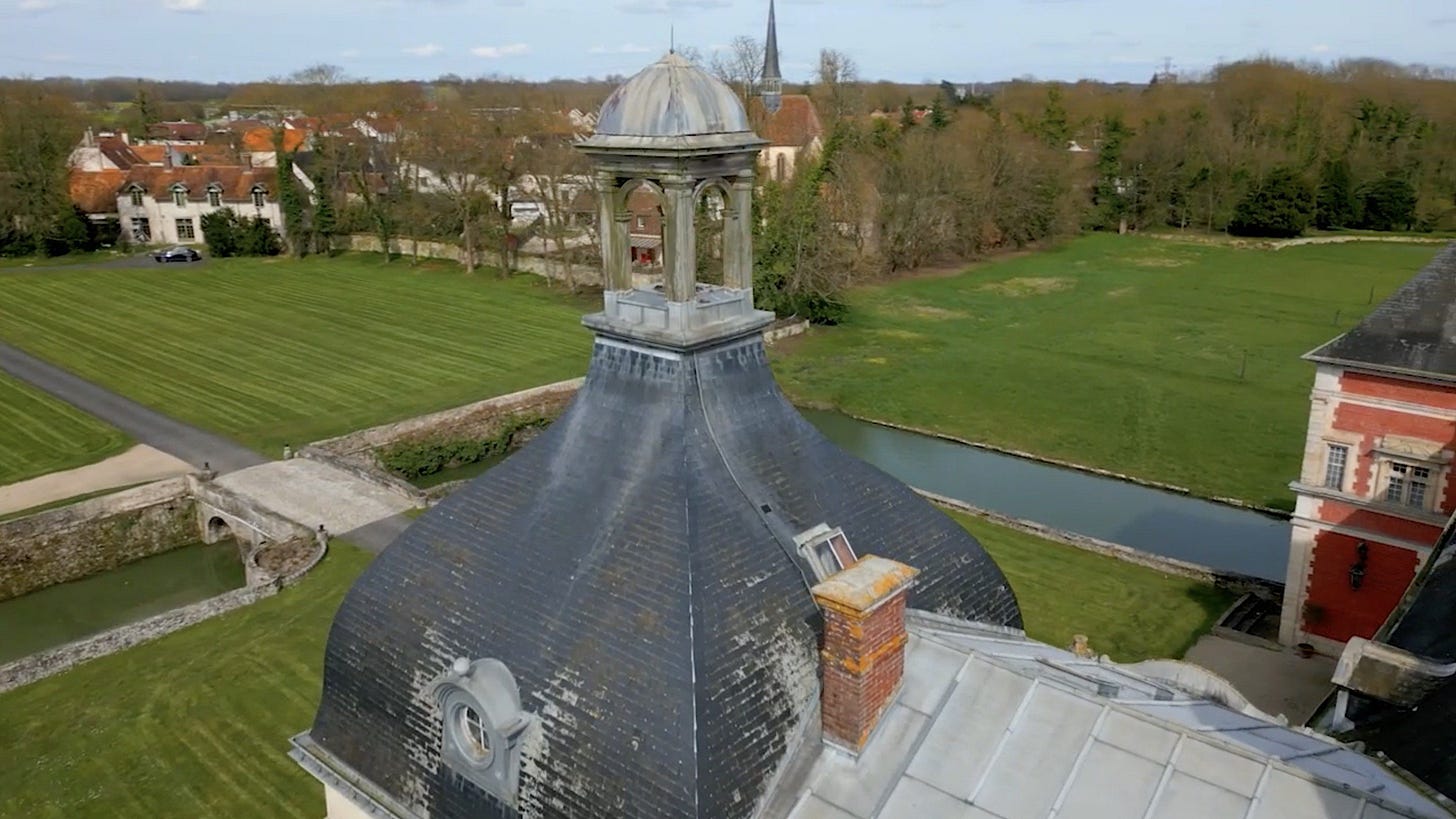
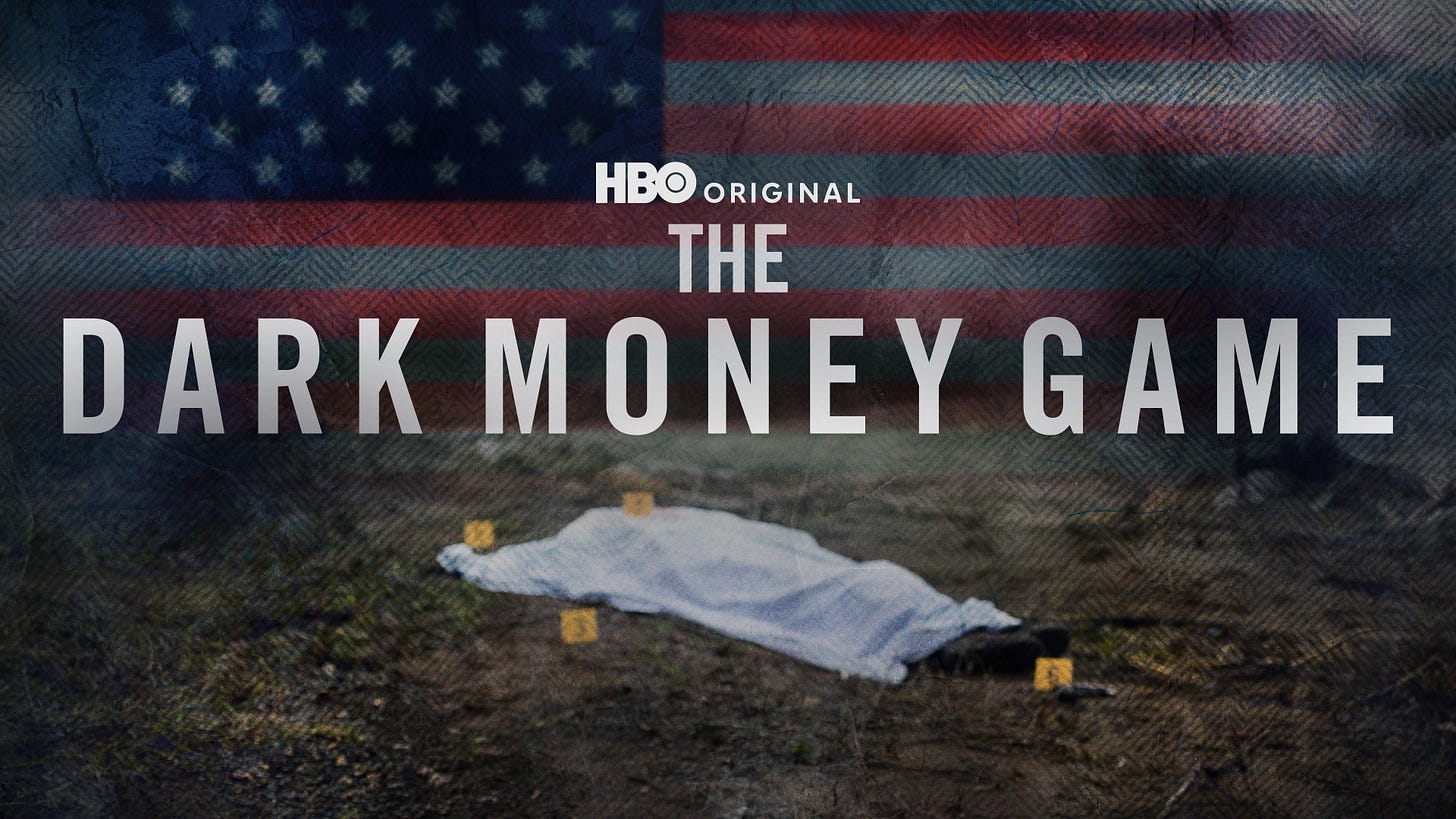

Just started Your Friends and Neighbours so enjoying chat on that, but also now interested in The Dark Money Game, so thanks for the info!
I've had The Dark Money game at the back of my docuseries list for the past few weeks but wasnt sure about it. Now I'll use your review to convince my girlfriend we need to watch it!
Also this french castle rénovation show sounds both frustrating and hilarious. Honestly even the biggest show payout in the world could not cover the money sink hole that comes with owning a castle. I give them a year before they give up and try to sell it 😂.